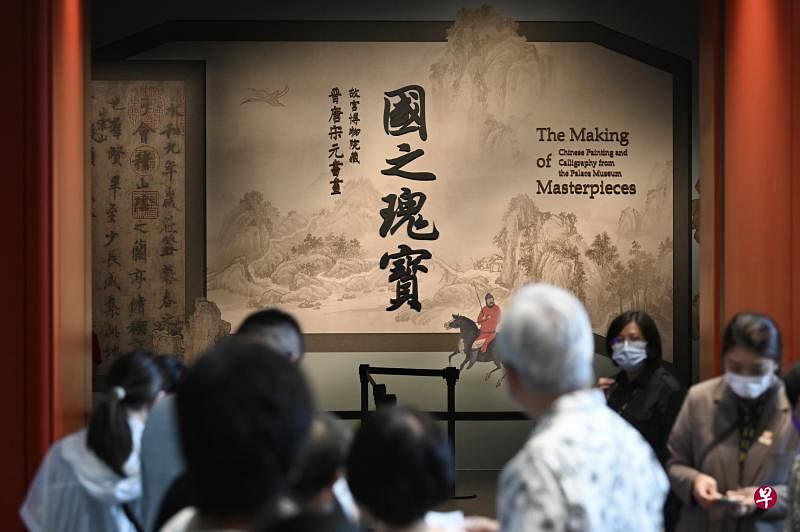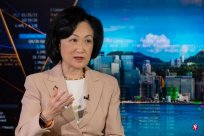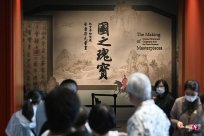
Hong Kong people Hong Kong affairs
In the 1980s and 1990s, Hong Kong has always been an important engine of Asian culture development.After the return of 1997, even if the economic strength of Hong Kong fell, is still a popular place for Chinese and foreign culture.With the strong support of the Central Government of China, Recently, Hong Kong is actively creating a center of culture and art exchange in China and foreign countries, contributing to "say good Chinese stories".
The Hong Kong Palace Museum on the western end of the West end of the West Nine Cultural District of Tsim Sha Tsui. After official opening to the public on July 3, a large number of citizens have been waiting to visit every day.
Zeng Ronghui (36 years old) is one of them. After visiting the Forbidden City of Hong Kong in early August, he was impressed by the Hong Kong Forbidden City. He said that many precious cultural relics that could only be seen in the Forbidden City in Beijing in the past are now in the Hong Kong Forbidden City.It is not easy to see.
Zeng Ronghui is engaged in community service work.After work, he is also the chairman of the "Zengzi Culture Association" in Hong Kong, and is committed to promoting traditional Chinese culture in the society.
Zeng Ronghui said in an interview with Lianhe Morning Post that it has many advantages in promoting Chinese traditional culture in Hong Kong.The first is convenient transportation. Before the epidemic, many foreigners used Hong Kong as a transit station, from time to time to travel through Hong Kong and foreign countries. The second is that Hong Kong has long been in the international metropolis.culture.
Zeng Ronghui, for example, once he went to kindergarten to promote Chinese -style clothing -Hua clothing, there are many South Asian students in kindergartens. They are very happy when trying to penetrate Chinese clothes.EssenceHe said: "The relationship between people is first from contact. Hong Kong is a good platform that can directly make foreigners feel traditional Chinese culture, so as to push themselves and others."
Traditional advantages of cultural industry have been impacted in recent years
For a long time, many people think that Hong Kong is just an international financial center, a shopping paradise, and a food capital of food, but it is not important in culture and art. It is a "cultural desert".In fact, Hong Kong also has first -class cultural soft power as the international metropolis with New York, London, and Paris.
As early as the 1980s and 1990s, Hong Kong had established a mature popular cultural industry for the global Chinese market.Whether it is Hong Kong production, TV series, or the output of Cantonese songs, it is all in Asia, attracting countless overseas people's interest in Hong Kong.
Although in recent years, facing the fierce competition in surrounding areas such as South Korea and mainland China, the traditional advantages of the Hong Kong cultural industry have been impacted, and the golden age of the entertainment industry has gradually passed.In recent years, Sotheby's and Christie's auction houses have held large -scale auctions in Hong Kong many times in recent years, establishing Hong Kong's position as an international art trading center.
After 2017, with the successive opening of multiple public and private museums and activation conservation projects, Hong Kong has gradually become the capital of the museum exhibition.Among them, the Grand Museum located in Central has attracted much attention from the outside world since its opening in 2018.
The Grand Museum is a activation plan for the Hong Kong Jockey Club and the Hong Kong Government. It has restored the three legal monuments of the former Central District Police Department, the Central Magistrate Department and the Yuedo Prison.The museum provides physical display space, allowing visitors to experience the court of the referee department and the prison house, and experience the historical scenes in person.At the same time, the new building of the Grand Museum, "Horse Racing Artists", has also set up contemporary art museums to provide venues for exhibitions from artists from Hong Kong and other regions.
At the same time, it covers an area of 41 hectares in the West Kowloon Cultural Area. In recent years, the work of building world -class cultural facilities is also in full swing.Since the opening of the opera center of the West Kowloon Cultural District in January 2019, the second performance venue of the West Kowloon Cultural District — the free space was also opened in May of the same year.Last year, the M+Museum located in the West Kowloon Cultural District opened, becoming a new visual culture museum in Hong Kong, which has formed a complete territory in Hong Kong in the local, mainland of China and foreign art and visual culture.
On March 3 this year, the Hong Kong Palace Museum of Culture opened, becoming the third "Forbidden City" of the three places on both sides of the strait after the Beijing Palace Museum and the Taipei Palace Museum, which means that under the blessing of Hong Kong in Beijing, the dynasty has become Chinese and foreign.The Cultural and Art Exchange Center has taken a big step.
Hong Kong Chief Executive Li Jiachao posted on a social platform on July 25 that the current SAR government was intended to build Hong Kong into a cultural capital and actively promote the creative economy.He said: "I hope to make the West Kowloon Cultural Area into the Cultural Hub of the Greater Bay Area, drive Hong Kong to become the preferred place for national cultural relics and artworks, and the national preferred performance art and cultural tourism center.Culture and art exchange center, make the artistic and cultural creative industry a new engine of Hong Kong economy. "
Political Drama Active Development of Cultural Exchange Center
Looking at the information, Hong Kong has held international cultural and artistic exchanges for many years, but the focus of the Hong Kong government's cultural and artistic development policies was often concentrated in five aspects: first, to ensure the freedom of personal creation and expression; second,Provide participation opportunities to the public; third, encourage diversified balanced development; fourth, support environmental space conditions.In summary, the cultural development of Hong Kong is the extension of the "big market, small government," the extension of the "big market, small government", and negatively promote the development of cultural and artistic development.
However, the Chinese government clarified the new positioning of Hong Kong's "Eight Center" in the 14th five -year plan (2021 to 2025) last year.The continuous development of the shipping center has also joined four emerging centers for the first time, including "supporting the development of Hong Kong to develop Chinese and foreign culture and art exchange centers."
Later, the Hong Kong Government's cultural and artistic development policy soon changed from passive to active, and actively developed.On May 11 this year, when Chen Jizhi, then director of the Civil Affairs Bureau of the Hong Kong Government, attended the Legislative Council meeting, he mentioned the five major priorities of the future Hong Kong cultural and artistic development policies, including strengthening the relationship with overseas art and cultural institutions.
Chen Jizhi pointed out that the Hong Kong Government has signed a memorandum of cultural exchanges and cooperation with 20 countries, including many large cultural powers, laid the foundation for cultural exchanges between China and foreign countries;Hold close cooperation to hold different cultural activities in Hong Kong, such as the "French May" art festival, "my Italian Italia Mia", "South Korea October Cultural Festival", and "Asian Art Cai" programs.
Ye Deping, president of the Hong Kong History and Culture Research Association, was interviewed by the United Morning Post that the Hong Kong government changed its previous negative attitude and actively developed a center of cultural exchanges between China and foreign countries.In recent years, the rise of mainland China has aroused concerns about Europe and the United States, especially the United States. In this case, it can be foreseeable that Europe and the United States and mainland China will be politically and economic in the future.It is difficult for the generals to live peacefully.In this context, culture and art have become a new opportunity, so that everyone can continue to communicate peacefully.
Ye Deping believes that as a large country with 5000 years of civilization, mainland China propagate the image of the country through cultural soft power, which is far more effective than other ways.Therefore, Beijing officials proposed to support the development of Hong Kong's development of Chinese and foreign cultural exchanges in the "Fourteenth Five -Year Plan" plan last year, hoping that Hong Kong played the role of a buffer area and used culture and art to "tell Chinese stories" to Europe and the United States.
Ye Deping believes that Hong Kong has sufficient conditions to develop into a center of culture and art exchanges between China and foreign countries.First of all, Hong Kong's special historical background allows it to become a hub for cultural exchanges between China and foreign countries.Secondly, Hong Kong, as one of the leading cities in the Greater Bay Area, is also the city with the highest level of internationalization in the district. The most conditional conditions have become the center of Chinese and foreign culture and art exchange.Third, Hong Kong has actively cooperated with the national "14th Five -Year Plan" in recent years. It has developed into the center of the China and foreign culture and art exchange centers as its core goal. The degree of investment in culture and art has exceeded the past.
Lack of local talent leading activities
Hu Enwei, a senior cultural person in Hong Kong, was interviewed by the United Morning Post that in recent years, there have been many problems in the development culture of the SAR, including attention in the development of "activities".Resources, a large number of resources to hold the Anglo -American and Western art activities, cultural activities have become "trading" activities, but they have not only learned the leading models and policies of artists who have not learned Western planning cultural venues.
Another problem is the lack of cultivation of local cultural talents.Hu Enwei said: "One of the characteristics of Hong Kong culture is led by rich people, and the heads of many museums and art groups are not locals, all foreigners. Let a Westerner who does not know Hong Kong culture at all to dominate.A kind of cultural colonial, what is made will only be uncomfortable. "
Ye Daping, president of the Hong Kong History and Culture Research Association, also agreed that the number of professionals in Hong Kong such as the cultural relics of the Forbidden City, the number of practitioners engaged in related cultural management and art management are not enough.After the completion of a number of cultural and artistic facilities in the future, Hong Kong will need more talents.To solve this problem, it is necessary to cooperate with university to cultivate more talents in this area.
He pointed out that fortunately, the Hong Kong administration has begun to work. Like the Hong Kong University of Education, in September this year, the first cultural "cultural heritage education and art management honorary literary scholars" will be launched in September this year. The purpose is to cultivate cultural and artistic talents in the Greater Bay Area.
Ye Deping pointed out that in addition, Hong Kong's cultural and art -related educational work is not perfect.It is a pity that Hong Kong has an excellent museum and art museum, but it cannot be applied to primary and secondary education.Therefore, the Education Bureau must strengthen relevant planning, invite industry professionals or groups to make suggestions, and find a way to "ground gas" in related education.
Looking forward to the future, Ye Daping believes that there are many cultural and historical stories in Hong Kong that can inject culture into tourism and allow tourism to carry the inheritance of culture and the connection of emotions.
Ye Deping said that the father of Vietnam's father, Ho Chi Minh, was imprisoned in Hong Kong Dori Prison in 1931, now the Grand Museum.Over the years, every year on the anniversary of Ho Chi Minh's birthday, the Vietnamese Consulate General in Hong Kong will hold a commemorative event here.Hong Kong can create a historical route that attracts Vietnamese tourists to travel, and pursue historical and cultural traces while visiting.
Hu Enwei believes that if you want to improve the soft power of Hong Kong, Hong Kong should rebuild traditional Chinese cultural systems and develop Hong Kong characteristics, especially to cultivate local literary and artistic talents.In addition, the Hong Kong Government should also consider setting up a cultural and art exchange platform similar to the Japanese Cultural Exchange Foundation, or British Culture Association, the French Cultural Association, and the German Goethe Institute.Essence
Hu Enwei explained that in recent years, the world's political situation has changed sharply, the relationship between mainland China and western countries has been adjusted and opposed. Hong Kong also needs to re -position culture and art, from the west as the core to the world as the core, for example, through many yearsCome with the interpersonal network established with various places to promote Hong Kong and Chinese culture in countries and regions of the Belt and Road.
He said: "For example, Hong Kong can cooperate with countries including India, Pakistan, Singapore, and Thailand to drive different cultural and artists in the Asia -Pacific region to carry out in -depth cultural exchanges and cooperation."



